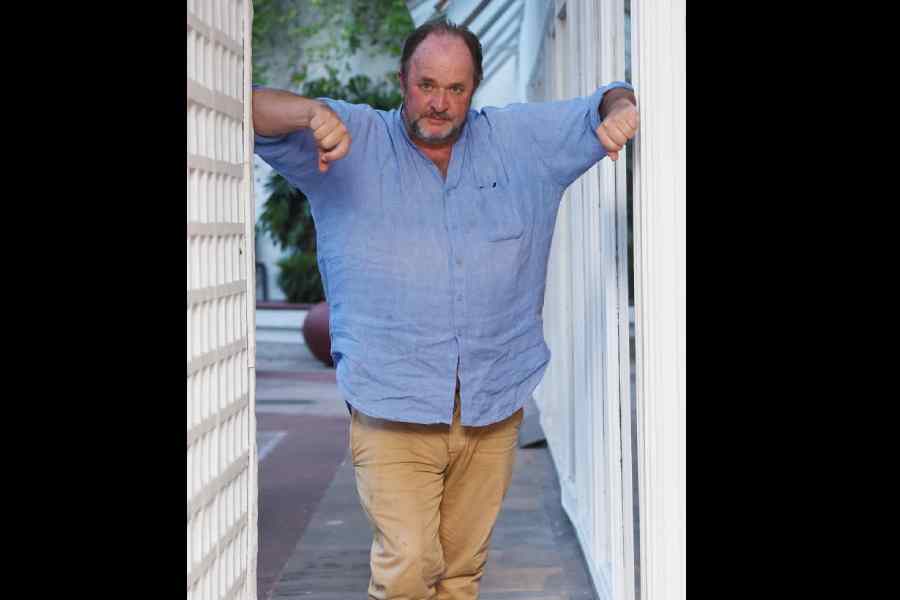True picture
The Financial Times Weekend Festival had William Dalrymple talking about his new book, The Golden Road: How Ancient India Transformed the World. Dalrymple has done much to transform the image of India in the West, especially persuading Britain to take off its rose-tinted spectacles to view the Empire. A recent social survey has greatly upset the Right in Britain because it found that young people are less willing to accept the notion that the Empire was largely a force for good. Dalrymple’s last book on the East India Company, The Anarchy, probably had something to do with this. “I’m only a humble foot soldier in a wider movement, but yes, there’s been an awful lot of work by many authors showing that the very uncritical view of Empire that we were brought up with hid an awful lot of war crimes and atrocities,” he remarked as we chatted.
The Golden Road states that India, not China, “was the beating heart of Asia between 250 BC and 1,300 AD”. Dalrymple tells me he has now lived in India for almost 40 years — “I live there for the pleasure of it, not for duty or necessity.” He surprises me by adding that his books now sell more in India than in Britain — “Anarchy sold 100,000 hardbacks in India, and I would imagine a third less in Britain”.
When I wonder why there isn’t an Indian version of Dalrymple living in the UK and being positive about Britain, he replies: “In a different field, there hasn’t been a Rishi Sunak in India. You’ve got the Mittals. You’ve got 1,000 super successful Indian businessmen all over this country. So I’m not sure I would entirely agree with your assessment. A humble author does not equate to half the cabinet.”
Own path
Moeen Ali, who has just announced his retirement as an English cricketer at the age of 37, will be remembered not just for his achievements in 68 Tests, 138 one-day internationals and 92 Twenty20s but also for bringing greater understanding of Islam into the dressing room. A year after Moeen was picked for England in 2004, I went to see him in Birmingham. With his flowing beard, he stood out as the Muslim in the side. Yet he reminded me more of the photographs of W.G. Grace, the Englishman who had dominated cricket a century earlier.
Moeen’s embrace of Islam brought an unpleasant rebuke from Michael Henderson in a Daily Telegraph article: “You’re playing for England, Moeen Ali, not your religion.” Moeen, who didn’t feel he had to go out drinking with the lads in order to bond with them, said: “I love cricket and I give 100% but at the end of a tough day I can tell myself it’s just a game, just my hobby really. My religion is more important. I just want to be the best person I can be. God won’t count how many hundreds I’ve scored or the five-fers I’ve taken.”
Safety first
Several doctors in a 200-strong crowd recalled their happy days of medical training in Calcutta in general and at RG Kar Medical College and Hospital in particular when they were at a protest meeting in London last Sunday over the “horror at the hospital”. The venue was by Gandhi’s statue in Parliament Square. Lalita Bisht, who works at Worthing Hospital in Sussex as an anaesthetist, was clearly in great distress: “For the last few days, I couldn’t sleep properly. I did my post graduation from RG Kar from 1998 to 2000. I felt very safe there. Even my brother, who is an army officer, told me, ‘You are very much used to asking help from strangers in Calcutta. Don’t do the same when you come to visit us in north India because it’s not the same here.’ ”
Anirban Mandal, a consultant plastic surgeon from Liverpool, remembered: “When we were students and trained there, we never heard of these things in Calcutta... Such crimes and corruption were completely unheard of. Obviously we need justice... but then you also need a prevention strategy. Otherwise, this is going to repeat...”
Spiritual medley
My uncle, the last member of my father’s generation, died a few days ago in Colchester, leaving instructions for me to organise a funeral that included “a full Christian service followed by a full Hindu service.” This was possible thanks to the generosity of Reverend Peter Evans, a former vicar, and Jyotirindra Bhattacharya, who explained the Hindu cycle of birth, death, rebirth and moksha. We had “Moonlight Sonata” as the entry music; the hymns, “I vow to thee, my country” and “Amazing grace”; a reading of Clare Harner’s 1934 poem, “Do Not Stand At My Grave and Weep”; The Lord’s Prayer, and the committal and blessings. We also had Tagore’s “Farewell My Friends”; Indranil Sen’s rendering of “Amar mukti aloy aloy” (which I had heard at Nirad C Chaudhuri’s funeral in Oxford in 1999) and Hindu incantations, which my uncle’s English friend found “so spiritual”.










